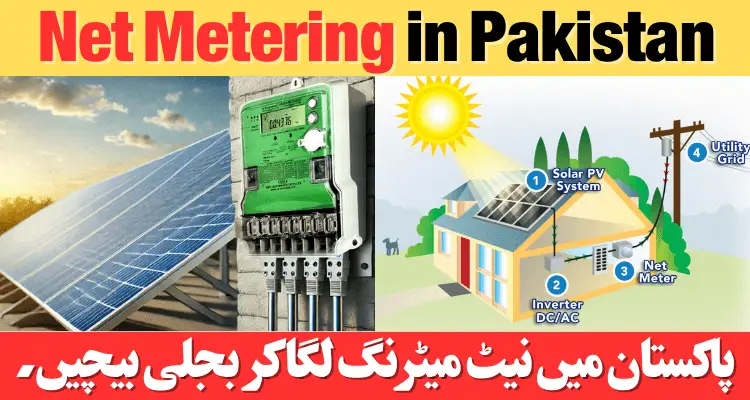Net metering is a crucial component of Pakistan’s energy landscape, facilitating the integration of renewable energy sources, particularly solar power, into the national grid. This system allows consumers to generate their own electricity, use what they need, and feed any surplus back to the grid, receiving credits on their electricity bills in return. This practice not only reduces electricity costs but also promotes sustainable energy consumption and production.
نیٹ میٹرنگ پاکستان کے توانائی کے منظر نامے کا ایک اہم جزو ہے، جو قابل تجدید توانائی کے ذرائع بالخصوص شمسی توانائی کے قومی گرڈ میں انضمام میں سہولت فراہم کرتا ہے۔ یہ سسٹم صارفین کو اپنی بجلی خود پیدا کرنے، اپنی ضرورت کے مطابق استعمال کرنے اور کسی بھی اضافی رقم کو گرڈ میں واپس کرنے کی اجازت دیتا ہے، اس کے بدلے میں اپنے بجلی کے بلوں پر کریڈٹ وصول کرتا ہے۔ یہ مشق نہ صرف بجلی کی لاگت کو کم کرتی ہے بلکہ پائیدار توانائی کی کھپت اور پیداوار کو بھی فروغ دیتی ہے۔
Explore the Roshan Punjab Program: Bank of Punjab’s Latest Initiative
Contents
What is Net Metering in Pakistan?
Net metering in Pakistan was introduced by the National Electric Power Regulatory Authority (NEPRA) in 2015. It enables consumers with renewable energy installations, such as solar photovoltaic (PV) systems, to connect to the national grid. When these consumers generate more electricity than they use, the excess energy is fed back into the grid, and they receive credits on their electricity bills. This system encourages the use of renewable energy and reduces reliance on conventional power sources.
Net Metering Rates in Pakistan
As of 2024, the net metering tariff in Pakistan is Rs. 19.32 per kWh, according to NEPRA regulations . This rate is designed to ensure that consumers are fairly compensated for the surplus electricity they contribute to the grid. However, there have been discussions about revising the tariff, with proposals to reduce it to Rs. 9 per kWh, which were met with opposition from various stakeholders . The compensation mechanism is based on “net energy billing,” where consumers are billed for the net electricity consumed from the grid after accounting for the energy exported.
Get Your Free Solar Panel Worth 40,000: 8800 Free Solar Financing Guide

How to Apply for Net Metering
Applying for net metering in Pakistan involves several steps:
- Solar System Installation: Install a solar PV system at your premises, ensuring it meets NEPRA’s technical criteria.
- Engage a Registered Solar Company: Contact an AEDB-registered solar company to handle the net metering application process.
- Application Preparation: The solar company will assist you in preparing the necessary documents and submitting the application.
- Inspection and NOC Issuance: Upon approval, the relevant energy department will inspect the installation and issue a No Objection Certificate (NOC).
- Signing Agreement: After receiving the NOC, sign an agreement with your electricity provider for a period of three years.
- Generation License: Submit the signed agreement to NEPRA for verification and obtain a generation license.
- Activation: Upon obtaining the generation license, net metering is activated, allowing you to sell surplus electricity to the grid .
Breaking News: Punjab Government Announces Solarization of Agriculture Tube Wells in 2024
Net Metering Eligibility Criteria
To be eligible for net metering in Pakistan, the following criteria must be met:
- Consumer Type: Any residential, commercial, or industrial consumer can apply.
- System Compliance: The solar PV system must meet NEPRA’s technical standards, including safety and performance requirements.
- Grid Connection: The property must be connected to the distribution network.
- Installation by Professionals: Solar panels must be installed by qualified professionals registered with AEDB .
Benefits of Net Metering
- Cost Savings: Net metering allows consumers to offset their electricity bills significantly by earning credits for the excess energy they produce. This results in substantial long-term savings.
- Return on Investment (ROI): The initial investment in solar panels can be high, but net metering accelerates ROI by allowing system owners to earn credits for the surplus electricity. Over time, the savings help recover the initial costs .
- Environmental Impact: By utilizing solar power, individuals and businesses reduce their carbon footprint and contribute to environmental sustainability. This aligns with global efforts to combat climate change .
- Grid Stability: Integrating solar energy through net metering enhances grid stability. Surplus electricity injected into the grid during peak sunlight hours helps meet energy demand and reduces strain on conventional power sources .
Challenges and Solutions
- Intermittency of Solar Power: Solar energy production depends on sunlight availability, leading to intermittent power generation. Advances in energy storage technology, such as batteries, can help mitigate this challenge by storing excess energy for use during low production periods .
- Lack of Awareness: Many consumers are not fully aware of the benefits and procedures of net metering. Educational initiatives, workshops, and outreach programs by solar energy providers can increase awareness and adoption .
- Regulatory Hurdles: The net metering application process can be complex. Efforts to streamline regulatory procedures and provide clear guidelines can facilitate smoother participation .
Opportunities
- Government Support: The Pakistani government is actively promoting renewable energy through incentives, subsidies, and a supportive regulatory framework. Understanding and leveraging these policies can enhance the benefits of net metering .
- Technological Advancements: Innovations in smart metering, storage solutions, and grid integration are continuously evolving, offering new opportunities for maximizing the benefits of net metering .
- Energy Security: By decentralizing energy production, net metering enhances energy security. It reduces reliance on centralized power plants and mitigates the risk of widespread blackouts .
FAQs
What is net metering?
Net metering is a system that allows consumers to generate their own electricity using renewable sources like solar power and feed any surplus back into the national grid, receiving credits on their electricity bills.
How does net metering work in Pakistan?
In Pakistan, consumers with renewable energy systems can connect to the national grid. Surplus energy is fed back into the grid, and consumers receive credits on their electricity bills based on the net energy consumed.
What are the current net metering rates in Pakistan?
As of 2024, the net metering tariff is Rs. 19.32 per kWh. There have been proposals to reduce this rate, but they have been met with opposition from various stakeholders.
What are the benefits of net metering?
Benefits include cost savings, accelerated return on investment, reduced carbon footprint, and enhanced grid stability.
What are the challenges of net metering?
Challenges include the intermittency of solar power, lack of consumer awareness, and regulatory hurdles. These can be addressed through technological advancements, educational initiatives, and streamlined regulatory processes.
Conclusion
Net metering in Pakistan represents a transformative step towards a sustainable energy future. It offers significant economic, environmental, and energy security benefits while presenting challenges that can be addressed through technological innovation, regulatory improvements, and increased public awareness. Embracing net metering is not just a choice but a collective responsibility towards a greener and more prosperous future.

